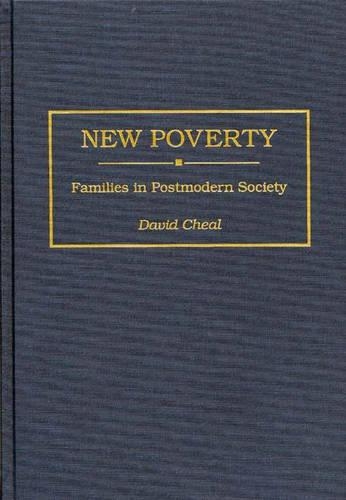
New Poverty: Families in Postmodern Society
(Hardback)
Available Formats
Publishing Details
New Poverty: Families in Postmodern Society
By (Author) David Cheal
Bloomsbury Publishing PLC
Praeger Publishers Inc
30th June 1996
United States
Classifications
Tertiary Education
Non Fiction
362.50973
Physical Properties
Hardback
232
Description
Cheal argues that the sociology of poverty has entered a new postmodern phase. The new poverty is about loss of faithin relationships that were once believed to last a lifetime, and in government programs that we used to think would last for generations. The new poverty is about the economic fall of individuals and countries who used to be affluent and who once dreamed that their affluence would go on forever. It is about the experience of free-falling, without a parachute and without much of a safety net. The new poverty is about people who lose their jobs when their company downsizes. It is about people whose hours of employment are cut in half when the work runs out. And it is about couples who separate, thereby plunging one of themand probably their childreninto a low income level that they had never anticipated. What is new about the new poverty is the sense of surprisethat poverty can hit so suddenly, that people can fall so far before they are caught and lifted up, that the poverty of children still troubles us after a century of progress. The new poverty is about our loss of faith not only in relationships that were once thought to last a lifetime, but also in government programs that we believed would last for generations. Cheal translates the experience of the new poverty into sociological theory and into social statistics. His purpose is to provoke serious, critical reflection about families today and the risks of being poor. An important study for scholars and researchers involved with family issues and social policy.
Reviews
"David Cheal provides a coherent examination of one of the most important effects of crisis: the "postmodernization of poverty.,.".[A]n accessible examination of contemporary problems in social policy."-Review of Radical Political Economics
After characterizing modernizing theories of social change, Cheal concludes that postmodern disarray and despair best describe poverty and social security policies at the end of the 20th century. The most visible result of this disarray is that poor children are relatively worse off than at the century's beginning, despite a century of rhetoric about improving the lives of children....This informed study is built solidly on existing research and adds new statistical analysis of life-course gradients of poverty that usefully compares US and Canadian social security influences. It successfully demonstrates the relationships between shifting family situations and the risks of being poor. Readers cannot escape the force of its overall conclusions that welfare states have produced new forms of relative deprivation rather than social solidarity. A useful book for undergraduates and above.-Choice
David Cheal provides a coherent examination of one of the most important effects of crisis: the "postmodernization of poverty.,.".[A]n accessible examination of contemporary problems in social policy.-Review of Radical Political Economics
David Cheal's book is a serious investigation of poverty, and, as such, rigorously specifies measures and elaborates their relative advantages and disadvantages. His writing is often technical although accessible....He writes with precision in regard to the empirical data and illustrates points with clear examples.-Child & Adolescent Social Work Journal
Overall, this book serves as a thoughtful analysis of a serious social ill. As a secondary text, it could prove useful in providing a historical grounding in poverty scholarship. It is clearly written and contains an adequate amount of charts and statistical information about the households and economies in the United States and Canada....-Families in Society
"David Cheal's book is a serious investigation of poverty, and, as such, rigorously specifies measures and elaborates their relative advantages and disadvantages. His writing is often technical although accessible....He writes with precision in regard to the empirical data and illustrates points with clear examples."-Child & Adolescent Social Work Journal
"Overall, this book serves as a thoughtful analysis of a serious social ill. As a secondary text, it could prove useful in providing a historical grounding in poverty scholarship. It is clearly written and contains an adequate amount of charts and statistical information about the households and economies in the United States and Canada...."-Families in Society
"After characterizing modernizing theories of social change, Cheal concludes that postmodern disarray and despair best describe poverty and social security policies at the end of the 20th century. The most visible result of this disarray is that poor children are relatively worse off than at the century's beginning, despite a century of rhetoric about improving the lives of children....This informed study is built solidly on existing research and adds new statistical analysis of life-course gradients of poverty that usefully compares US and Canadian social security influences. It successfully demonstrates the relationships between shifting family situations and the risks of being poor. Readers cannot escape the force of its overall conclusions that welfare states have produced new forms of relative deprivation rather than social solidarity. A useful book for undergraduates and above."-Choice
Author Bio
DAVID CHEAL is a Professor of Sociology, University of Winnipeg./e Among his earlier publications are The Gift Economy (1988) and Family and the State of Theory (1991).
